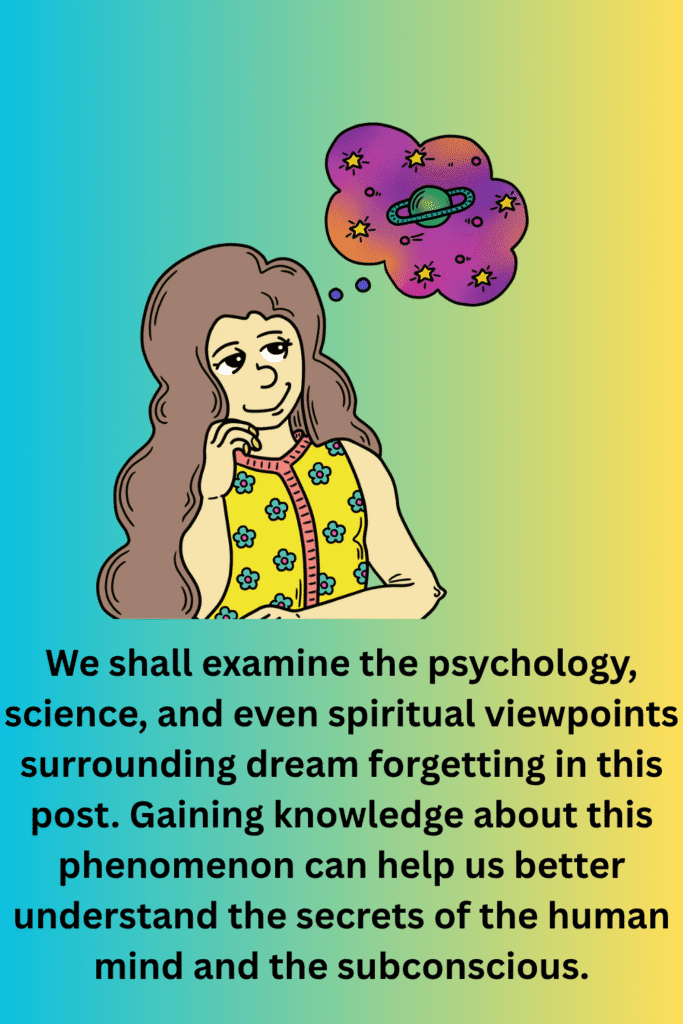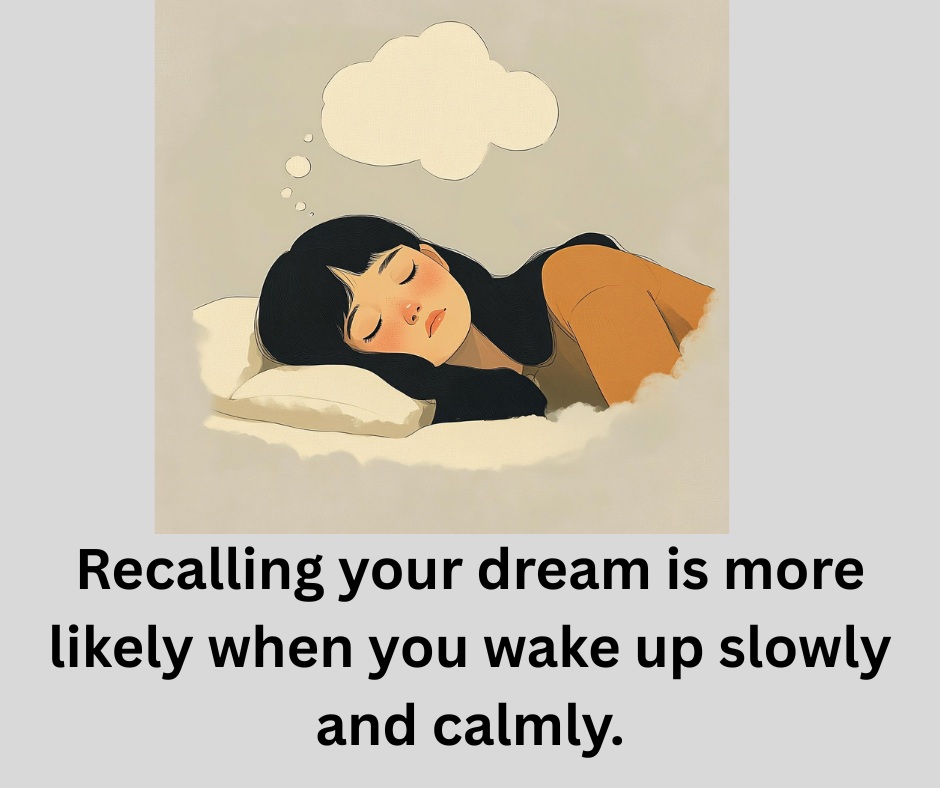Introduction
Why do we forget our dreams,Have you ever woken up with the impression that you had just experienced a strong, intense, or even strange dream, only to quickly forget it all? You’re not alone if this sounds familiar to you. Within minutes after waking up, the majority of people forget 90–95% of their dreams. This widespread occurrence begs the question:
Why do we forget our dreams?
We shall examine the psychology, science, and even spiritual viewpoints surrounding dream forgetting in this post. Gaining knowledge about this phenomenon can help us better understand the secrets of the human mind and the subconscious.

Table of Contents
The Science behind Dream Forgetting
The REM (Rapid Eye Movement) phase of sleep is primarily when dreams occur. During REM, our brain is highly active, almost as engaged as it is when we are awake. Why do we forget our dreams,One key difference, however, is that significantly fewer neurotransmitters are engaged in the process of memory formation.
Norepinephrine is a vital chemical messenger that plays a crucial role in the formation of memories. In REM sleep, norepinephrine levels drop, which reduces the brain’s ability to retain dream content in long-term memory.
Consequently, the biological functions required for accessing those dreams are largely “turned off” while we sleep, even if our minds are producing intricate and vibrant dreams.
Short-Term Memory Limitations
Our short-term memory starts up again when we wake up. However, because we don’t practice or reinforce dreams right away, they frequently don’t “stick.” Unless we try to remember or document them immediately, dreams fade fast, much like a passing thought or concept that vanishes without being recorded
Psychological Explanations
Psychologically speaking, the brain could not consider dreams to be significant information. What our subconscious mind deems “irrelevant” to daily existence is constantly being filtered out. Why do we forget our dreams,Since dreams are frequently abstract, irrational, or emotionally disturbing, the brain may not regard them as meaningful enough to store.
The idea that forgetting dreams could be an evolutionary adaptation to prevent information overload is called the “dream neglect” theory.
Emotional Disconnection
Numerous dreams lack emotional depth or coherence, but there are others that are profoundly impactful and stick in our minds. The likelihood of recalling a dream rises with its emotional weight. Consequently, while bland or monotonous dreams often fade away, terrifying or emotionally intense dreams are more likely to be retained.
Lifestyle and External Factors
Sleep Disruptions
Your brain might not have enough time to “transition” the dream into conscious recollection if you wake up suddenly due to an alarm or other disturbance. Recalling your dream is more likely when you wake up slowly and calmly.
Additionally, REM sleep can be disturbed and dream recollection harmed by a number of circumstances, including stress, alcohol, drugs, and sleep disorders.
Not Paying Attention to Dreams
With intention and effort, dream recollection gets better. Your brain won’t prioritize remembering your dreams if you don’t value or think about them. As a result, amnesia becomes a habit.
Why do we forget our dreams,The likelihood of remembering your dreams can be improved by journaling about them, making a conscious effort to remember them, or just remaining motionless for a little period of time after waking up.
The Spiritual and Symbolic Perspective
Dreams are frequently interpreted as messages from the higher self, spirit guides, or even different dimensions from a spiritual or metaphysical perspective. Why, then, would we overlook these crucial messages?
Among the spiritual justifications are:
• Protection Mechanism: Because certain dreams contain information you’re not yet ready to handle, your subconscious may erase those dreams from your memory.
• Spiritual Amnesia: Some people think that because full remembrance would overpower our present life experience, we forget dreams in the same manner as we forget past incarnations.
• Vibrational Shift: According to some dream experts, our minds change frequency or vibrational states when we wake up, which makes it challenging to remember dream information that is on a “different plane.”
These theories provide important insights into how people have always perceived dreams as more than just mental visions, regardless of your belief system.
Why Do Certain Individuals Recall Dreams Better Than Others
There are large individual differences in dream recall. Here are a few explanations:
• More dopamine can improve memory and dream vividness.
• Those who are innovative or creative frequently report having more vivid and memorable dreams.
• Those who meditate or engage in lucid dreaming may become more aware of their dreams; those who wake up during REM sleep on a regular basis are more likely to recall their dreams.
Why do we forget our dreams,It’s interesting to note that research has indicated that women recall their dreams more often than men do. This could be because of variations in how men and women process emotions and sleep.
How to Improve Dream Recall
- Here are some pointers to help you remember your dreams more frequently:
- 1. Maintain a Dream Diary
- Beside your bed, keep a notebook or utilize a smartphone app. As soon as you wake up, write down anything that comes to mind.
- Sure! Please provide the text you’d like me to paraphrase. Certainly! Kindly share the text you want to be rephrased. Please share the text that you would like me to rephrase.. Make a Decision
- Say to yourself, “I will remember my dreams,” before you go to bed. This little idea can significantly increase recollection.
- 4. Steer clear of sleep aids and alcohol.
- These have the potential to impair dream recollection and inhibit REM sleep.
9. Make Time for Sleep
The majority of REM sleep occurs in the second half of the night. Getting more sleep increases your chances of dreaming and remembering such dreams.
Are Forgotten Dreams Truly Lost?
Not always. According to some psychologists and experts, dreams can still affect your emotions, actions, and mental health even if you don’t recall them. Dreams can reveal subconscious thoughts, stimulate creativity, or impact your mood the following day.

Put another way, it doesn’t follow that your dream didn’t have an effect just because you can’t remember it.
Conclusion
What causes us to forget our dreams, then? A mix of lifestyle, psychology, neurology, and perhaps spirituality holds the key to the solution. Why do we forget our dreams,We may reverse the normal process of forgetting dreams with effort and intention, despite the fact that it is a natural occurrence due to factors including decreased brain chemistry during REM sleep and loss of emotional meaning.
Learning to remember dreams can provide important insights into your identity, regardless of whether you view them as windows to the soul, subconscious reflections, or simply intriguing brain activity.